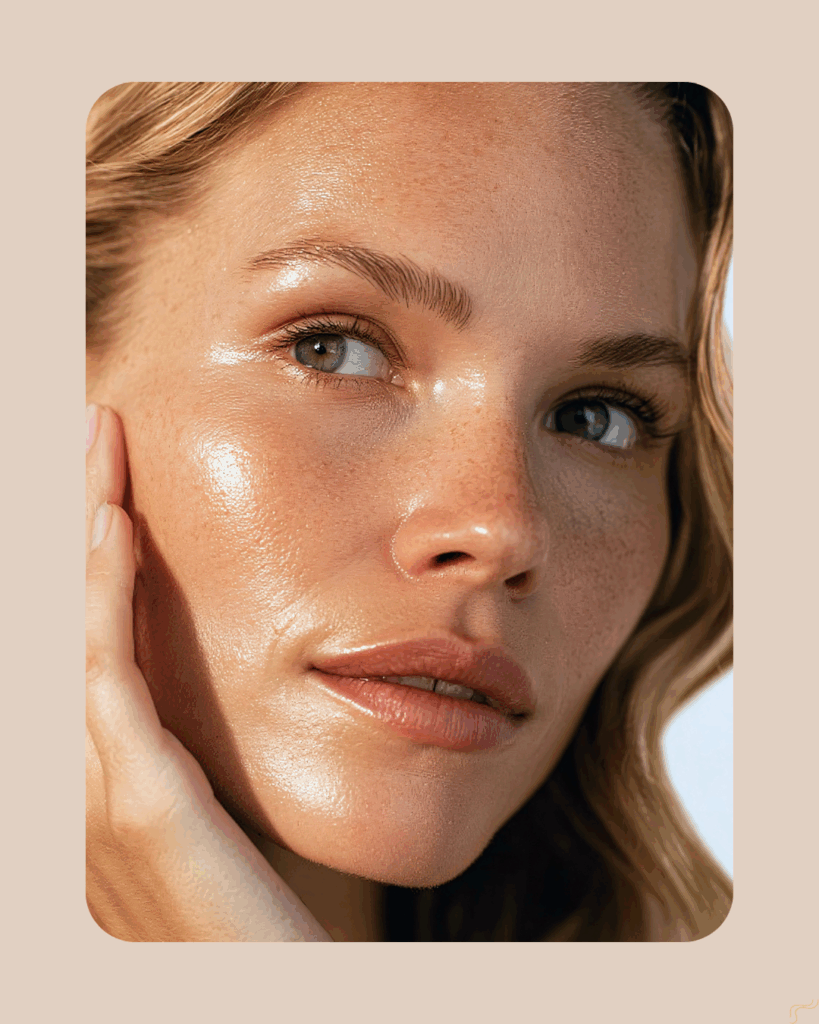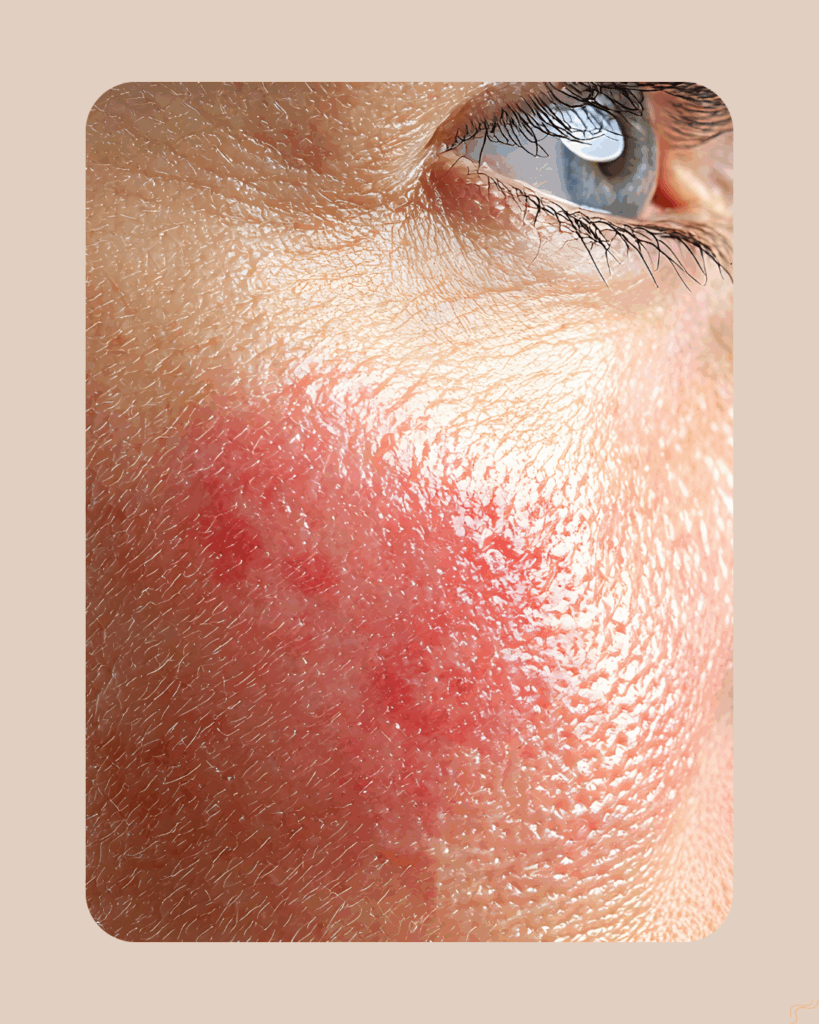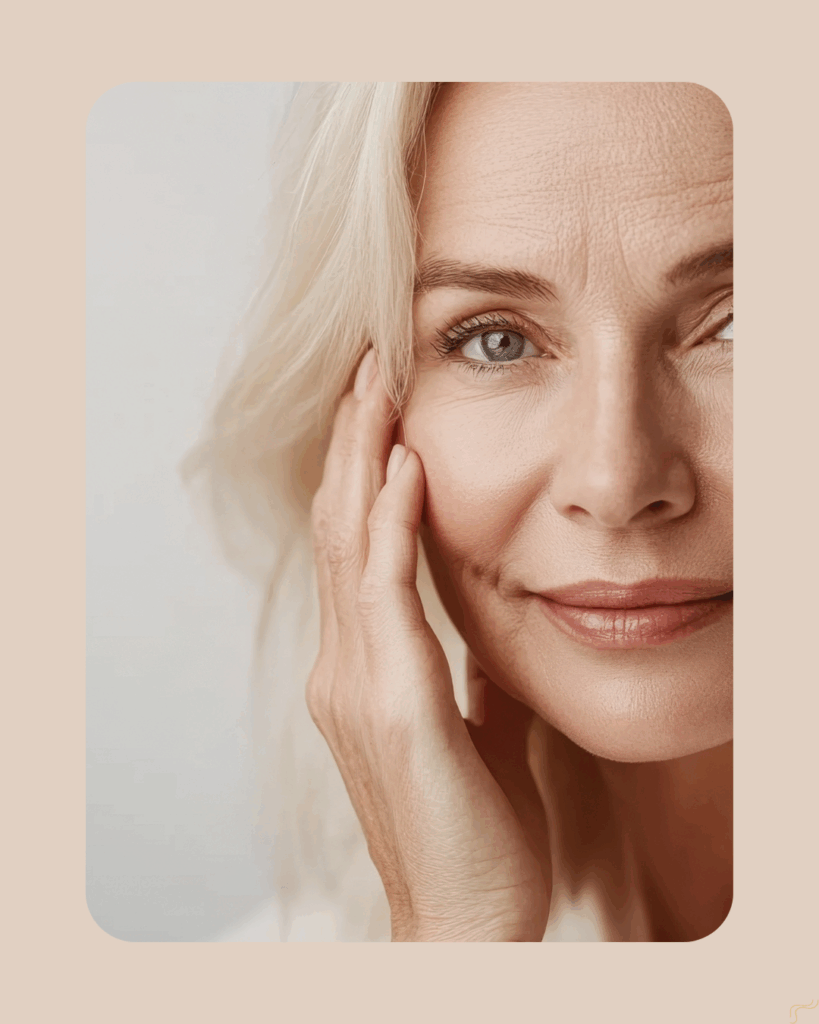SCROLL TO BEGIN
Confessions of a skincare junkie
Clean beauty
The Skin Shift: What’s Really Happening During Perimenopause and Menopause

There comes a moment when you catch your reflection and think, “When did my skin start needing a nap?” It isn’t your imagination. It’s your hormones.
Perimenopause and menopause aren’t just about hot flashes or unpredictable moods. They mark a full-body recalibration. The same hormones that once gave you plump, radiant, bouncy skin are now rewriting the script, and your complexion is along for the ride.
Let’s talk about what’s really happening—biologically, emotionally, and beautifully.
What Happens to Your Skin When Estrogen Levels Drop?

Estrogen is one of the unsung heroes of skin health. It supports collagen, elastin, and hyaluronic acid, the trio responsible for firmness, hydration, and smooth texture.
During perimenopause, estrogen levels begin to fluctuate like a soap opera plot twist. By menopause, they can fall by as much as sixty percent. The results are significant:
- Collagen decreases by about thirty percent in the first five years after menopause.
- Elasticity declines by roughly one to two percent each year afterward.
- Oil production slows, leaving skin drier and more sensitive.
- Blood flow to the skin diminishes, leading to a duller tone and slower healing.
Think of it as your skin going through its own midlife reinvention. There is loss, yes, but also wisdom and resilience.
Why Does Menopausal Skin Become So Dry and Sensitive?
Your skin barrier, the outermost layer, acts as your personal bodyguard. It keeps hydration in and environmental aggressors out. When estrogen declines, the lipids and ceramides that hold that barrier together begin to thin out.

The result is dehydration, sensitivity, and a sudden intolerance for products that once worked perfectly. Research shows a clear reduction in skin lipid synthesis after menopause, which explains why dryness becomes one of the most common complaints.
Here’s how to rebuild your barrier and keep your glow intact:
- Layer your hydration. Think essence → hyaluronic acid serum → nourishing moisturizer → face oil. Hydration needs to be sealed in with emollients to stay put.
- Feed your skin barrier with ingredients such as ceramides, cholesterol, peptides, and squalane. These strengthen the lipid layer that locks in moisture and defends against irritation.
- Support natural renewal with gentle exfoliation once or twice a week. Look for lactic acid or enzymes from papaya or pumpkin to soften and smooth without stripping.
- Add a night treatment rich in peptides and growth factors to stimulate collagen renewal while you sleep.
- Use nourishing oils like rosehip, jojoba, or evening primrose, which replenish essential fatty acids and help balance hormone-related dryness.
Think “nourish and restore,” not “strip and resurface.”
Can Hormonal Changes Cause Acne, Redness, and Sensitivity in Midlife?
Just when you think you’re done with breakouts, surprise.
Declining estrogen and relatively higher androgen levels, like testosterone, can trigger oil glands in the lower face and jawline, leading to hormonal congestion or acne.
At the same time, your weakened barrier can make your skin more reactive. Flushing, rosacea, and uneven tone may appear out of nowhere. Reduced estrogen affects microcirculation and immune response in the skin, which explains the unpredictable combination of dryness, redness, and irritation.
Here’s what helps:
- Niacinamide to calm inflammation, minimize pores, and support barrier repair.
- Azelaic acid or bakuchiol (a natural retinol alternative) to treat hormonal breakouts and uneven tone without harshness.
- Cooling treatments like LED light therapy or gel masks to reduce redness and heat.
- Simplify your routine when your skin feels reactive. A gentle cleanser, hydrating serum, and barrier cream can help reset the balance.
Your skin isn’t misbehaving. It’s communicating.
How Can You Support and Rebuild Menopausal Skin Naturally?

Midlife skin doesn’t need fixing. It needs understanding. This is the perfect time to shift from routine to ritual, from control to collaboration.
Inside Your Skincare Ritual
- Incorporate phytoestrogen-infused products, which use plant compounds to mimic estrogen’s skin benefits. Look for ingredients like soy isoflavones, flaxseed extract, red clover, and licorice root in your serums or moisturizers.
- Add peptide serums to rebuild collagen and firm the skin from within. Peptides act like messengers that tell your skin to make more collagen and elastin.
- Use hyaluronic acid and glycerin to deeply hydrate, then layer with a rich cream that includes ceramides and fatty acids to seal it in.
- Foaming cleansers can deplete moisture your skin desperately needs right now. Instead, look for a hydrating, nourishing formula—something creamy that calms and replenishes as it cleans.
- If you can, incorporate weekly facial massages or gua sha to boost circulation and lymphatic flow. Hormonal changes can cause fluid retention, and these rituals help move that along.
- At night, apply a repair cream or overnight mask with antioxidants, coenzyme Q10, and peptides to help restore elasticity while you rest.
Supplements That Support Skin and Hormones
- Add collagen peptides to your morning smoothie or tea. Research shows that daily use of hydrolyzed collagen can improve hydration, elasticity, and texture. Look for types I and III collagen and pair them with vitamin C to enhance absorption.
- Consider omega-3 fatty acids from fish oil or algae for anti-inflammatory and barrier-supporting benefits.
- A B-complex vitamin supports both energy and liver detoxification pathways (hello, hormone balance).
Don’t Forget the Liver
Your liver is your body’s ultimate multitasker. It processes and eliminates excess hormones, which keeps your skin and mood balanced. During perimenopause and menopause, the liver’s workload increases as it filters fluctuating estrogen levels. When it’s sluggish, that hormonal buildup can lead to dullness, puffiness, and breakouts.
Keep your liver happy by adding cruciferous vegetables (broccoli, kale, cauliflower), leafy greens, beets, and lemon water. These foods contain nutrients that help your liver perform its detoxification duties efficiently. A happy liver means happier skin.
Science Sidebar: The Liver–Hormone–Skin Connection
Hormone Regulation: The liver metabolizes estrogen and progesterone, converting them into forms the body can safely eliminate. When it’s overloaded, these hormones can linger, creating imbalances that show up in the skin.
Collagen Protection: A healthy liver reduces oxidative stress, which helps protect existing collagen from breaking down.
Detoxification: The liver’s two detox phases—Phase I (oxidation) and Phase II (conjugation)—convert fat-soluble toxins and hormones into water-soluble compounds that can be excreted. Nutrients like B vitamins, sulfur compounds, and antioxidants support this process.
Inflammation Control: A well-functioning liver helps reduce systemic inflammation, leading to calmer, clearer skin.
How Can You Embrace Skin Changes During Perimenopause and Menopause?
Your skin isn’t betraying you. It’s transforming with you. The glow you once chased is still there; it just looks different now.
It’s the kind of radiance that comes from awareness, wisdom, and the refusal to disappear quietly. The next time you notice a new line or a change in texture, don’t call it aging. Call it evidence of laughter, of strength, of evolution.
Your skin has been with you through every version of yourself. It deserves to be honored, not fought with.
BE THE FIRST TO COMMENT